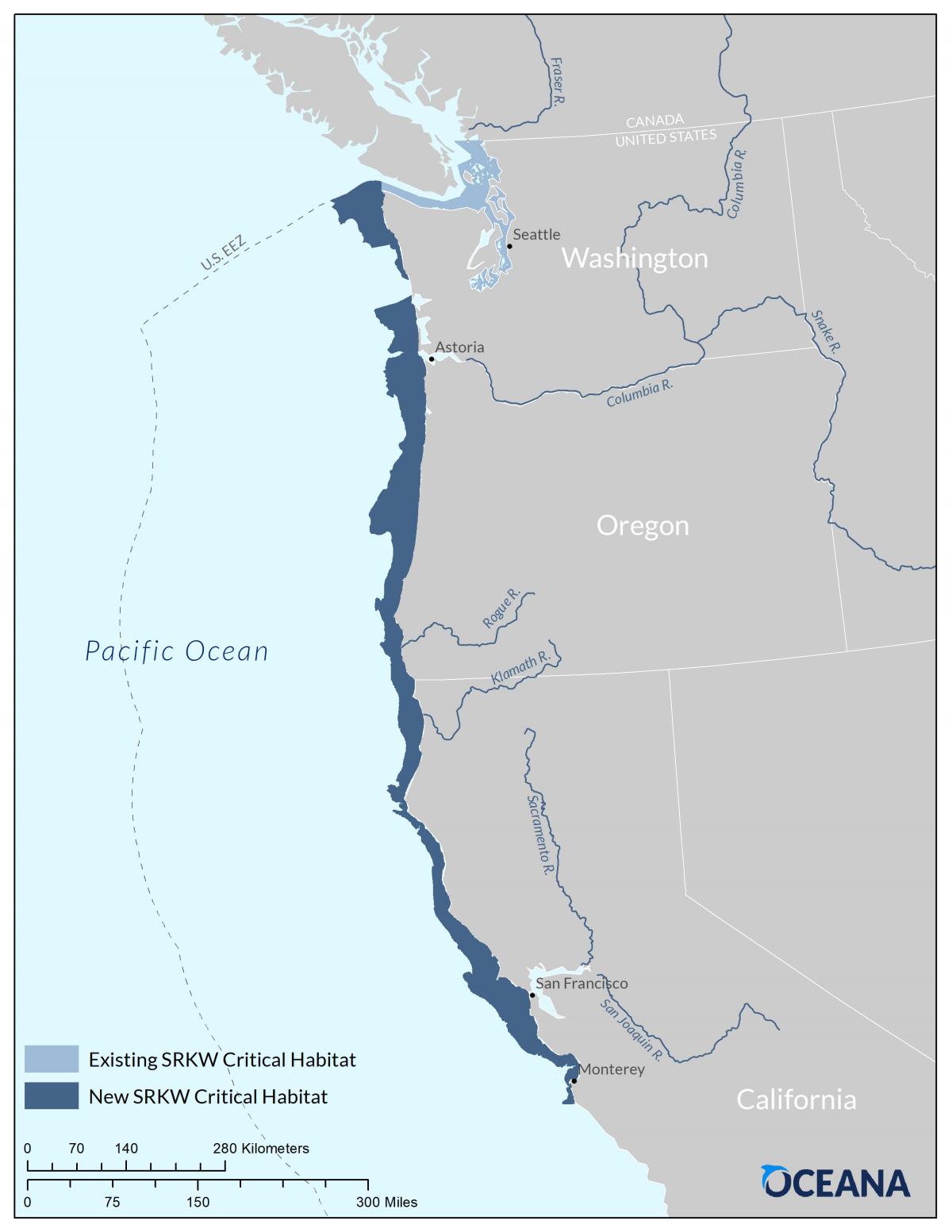Endangered Orcas Receive Critical Habitat Protections in U.S. Pacific
Press Release Date: July 30, 2021
Location: Washington, DC
Contact:
Dustin Cranor, APR | email: dcranor@oceana.org | tel: 954.348.1314
The Biden-Harris Administration has expanded critical habitat for endangered Southern Resident orcas along the outer coast of Washington, Oregon and as far south as Point Sur, California. The newly designated critical habitat areas span 15,910 square miles of Pacific oceans waters off the U.S. West Coast and recognize the vital importance of this area to Southern Resident orcas.
“This decision to expand critical habitat is a major step forward toward recovering these iconic orcas,” said Ben Enticknap, a senior scientist with Oceana. “The critical habitat designation will help ensure Southern Resident orcas have an ocean abundant with large salmon that is free from blinding ship noise and toxic chemicals. It’s a huge relief knowing we now have a strong commitment to protect the orcas’ ocean home.”
The first critical habitat for Southern Resident orcas was designated in the Salish Sea off Washington in 2006. The expanded habitat areas reflect more recent discoveries that Southern Residents also travel and feed off the outer coast, especially in the winter and spring when they follow early runs of large Chinook salmon returning to the Columbia River.
“We’re learning more about Southern Resident orcas every year, and it’s heartening to see the Biden-Harris Administration act on the science,” said Enticknap. “We have a responsibility to protect and recover Southern Resident orcas and this announcement will help make sure that happens.”
Southern Resident orcas are endangered with extinction, with only 75 individuals across three pods remaining in the population. Lack of prey, primarily Chinook salmon, is the principal threat to Southern Resident orca survival. Disturbance from underwater noise and vessel interactions, as well as toxic pollutants, also threaten the orcas’ recovery.
This distinct orca population evolved in the Northeast Pacific side-by-side with salmon. The orcas hunt cooperatively and share their food with other members of their clan. Studies show that 99% of their diet is salmon, with roughly 80% being Chinook salmon, the largest and most beneficial to orca health.
Many Chinook populations are in decline, and dozens are already extinct due to dams on salmon streams, habitat loss and excessive fishing pressure. Scientists warn, however, that without significant and immediate steps to recover the region’s Chinook salmon populations, this orca population will continue to slide toward extinction. Oceana and others have called for reduced ocean salmon fishing pressure, protection of salmon habitats, and dam removal to allow Chinook populations to rebound. Recently fishery managers proposed the first ever limit on ocean Chinook salmon fishing to provide more food for orcas, and policymakers in the Pacific Northwest are looking at effective ways to protect salmon habitat, including dam removal in some cases.
“While this action helps ensure the orcas’ ocean home will be protected, more action is urgently needed to restore wild salmon populations the orcas depend on,” added Enticknap. “Orca and salmon recovery go hand-in-hand, with benefits to a healthy ocean ecosystem, salmon fisheries, and communities throughout the region.”

Figure. New and previously designated critical habitat for the endangered Southern Resident killer whale (SRKW) and major Chinook salmon rivers.
Oceana is the largest international advocacy organization dedicated solely to ocean conservation. Oceana is rebuilding abundant and biodiverse oceans by winning science-based policies in countries that control one third of the world’s wild fish catch. With over 200 victories that stop overfishing, habitat destruction, pollution and killing of threatened species like turtles and sharks, Oceana’s campaigns are delivering results. A restored ocean means that one billion people can enjoy a healthy seafood meal, every day, forever. Together, we can save the oceans and help feed the world. Visit usa.oceana.org to learn more



